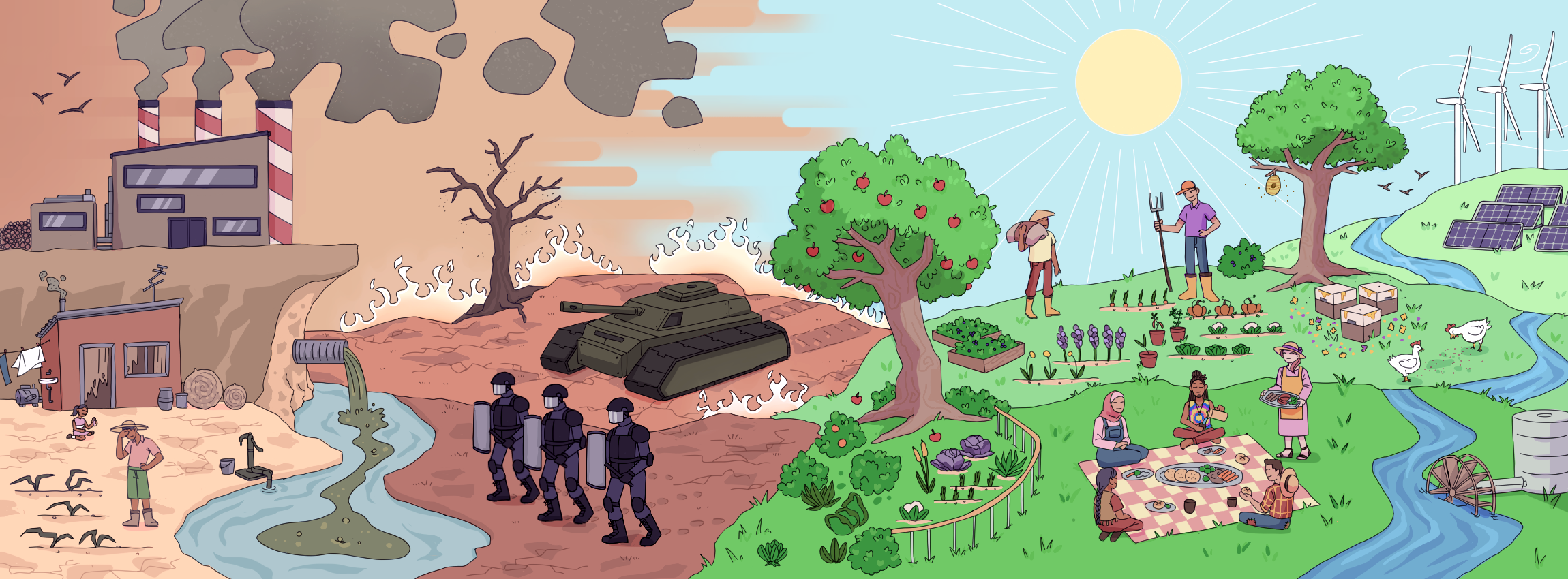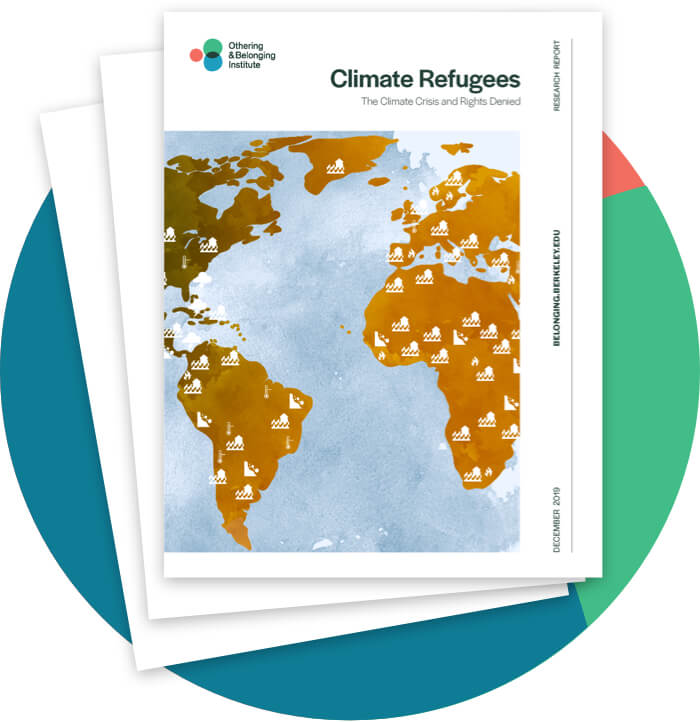Gabon
Introduction to Gabon
Gabon is a country located in the Congo-Basin region of Central-West Africa, home to approximately 2.2 million people.1 With one of the highest urbanization levels in Africa, over 80% of Gabon’s population resides in urban spaces. Despite its abundant natural resources, the country grapples with entrenched poverty and stark economic disparities. In rural areas, over 50% of residents live in poverty, and their poverty is three times more severe than that of the urban poor.2 The climate of Gabon is characterized by its tropical nature, with high humidity and abundant rainfall nurturing its rainforests and diverse ecosystems. Gabon's economy is largely driven by the extraction and export of natural resources, notably oil, timber, and minerals, which contribute significantly to its GDP and employment landscape3 , with oil attributing to 51 percent of the GDP 2022, up from 38.5 percent in 2021.4 It is the fifth largest oil producer in Africa and the second-largest manganese producer in the world, mining an estimated 4.6 million metric tons of the metal in 2022.5 Gabon reports one of the most developed economies in sub-Saharan Africa, and is a high-income country with a GDP per capita of 8,820.35 USD (2022)6 , yet the World Bank estimates that only 60% of Gabon’s population has access to electricity. However, the reliance on extractive industries poses inherent risks for Gabon's current environmental sustainability and economic stability. Today, Gabon’s narrative is intertwined with the scars of French colonial exploitation, largely shaping its political economy. Gabon’s independence was contingent upon signing cooperation agreements with France, leaving the extractive relationship of the colonial era largely unchanged. This relationship would fortify the future of Gabon’s economic and ecological future.
Mapping Major Climate Events and Climate-Induced Displacement
Gabon has a high degree of risk to natural hazards and is highly vulnerable to climate change impacts by way of seasonal flooding, extreme winds and landslides. Coastal regions and low-lying areas, where 75% of the population resides7 , face escalating risks from rising sea levels and intensified weather phenomena, namely the Ogooué-Ivindo and Moyen-Ogooué provinces. The port city of Port-Gentil is an economic hub for Gabon, home to its petroleum industry. It is one of several cities around the world at risk of disappearing underwater by 2050 at the current rate of rising sea levels8 , a reality that would displace over 100,000 residents. In recent decades, the frequency and severity of climate-related disasters have surged, leading to displacement and livelihood disruptions. Since 2008, the small nation has reported 5,100 climate-induced displaced persons.9 In May 2023, Franceville, the principal town of Haut Ogooué Province in Gabon, experienced severe rainfall and strong winds, resulting in significant destruction to public and private infrastructure, including schools, shops, and electricity poles. Nearly 200 homes were either destroyed or carried away by the force of the accompanying winds, and approximately 3,000 individuals overall, equivalent to 500 households, were affected by the event.10 Limited resources and infrastructure exacerbate the plight of those displaced, further underscoring the need for robust adaptation and resilience-building measures.
Mapping the Costs of the Climate Crisis
The current value of direct economic losses in Gabon amounts to 270 million USD, approximately 0.23% of the nation’s total stock value, with a large majority of these losses attributed to the housing and service sectors. Under the current climate, the AAL (Annual Average Loss) to the housing sector is approximately 120 million, and under future climate projections, these losses would climb to over 200 million USD.11 Approximately 21,000 people are annually affected by drought in Gabon, with the possibility of up to $185 million USD impacted each year due to drought. Flood-impacted areas contribute approximately 0.34% to the national GDP, amounting to roughly 50 million USD. Further, flood disasters amounting to $360 million loss are projected to occur once every five years, indicating that significant losses may be experienced frequently, with little time room for economic recovery.12 Gabon is also tasked with protection and preservation of the Congo Basin, as one of six nations it is home to. The rainforest forest expanse, as one of the world’s most significant carbon absorbers, removes carbon from the atmosphere valued at $55 billion per year, approximately equivalent to 36 percent of the GDP of all six countries combined.13
Mapping Resilience and Mitigation Pathways
Gabon is considered a global leader in climate action, and is widely hailed as the most carbon-positive nation worldwide. This is attributed to its robust environmental conservation efforts and unwavering political commitment to safeguarding its natural landscapes. Today, 88% of Gabon's landmass consists of forests, a feat made possible by decades of economic and political investments.14 Gabon became a partner of the Climate and Clean Air Coalition in 2020, affirming their commitment to combat air pollution and climate change.15 In 2021, Gabon made history as the first African nation to be compensated for carbon emission reductions. This achievement stems from an established agreement between Gabon and the multi-donor UN-hosted Central African Forest Initiative (CAFI) in 2019, securing a total of $150 million over a decade. Gabon had communicated their Intended Nationally Determined Contributions (INDC) to the United Nations Framework Convention on Climate Change (UNFCCC) in 2015. In the INDCs, the government highlights its commitment to reducing greenhouse gas emissions by at least 50% by 2025.16
Gabon has also additionally ratified the Paris Agreement and the Kigali Amendment to the Montreal Protocol, and in recent years, announced efforts to diversify its economy away from its dwindling oil reserves, though this plan of action has not been specified. As majoring of Gabon’s GDP is tied to oil production, President Ali Bongo Ondimba announced aims to reduce the oil sector’s share of GDP to below 20 percent by 2025.17 In March 2023, Gabon hosted the One Forest Summit, an initiative by the French government to promote the protection of tropical forests globally. Delegations from various nations, including France and the Central African Republic, ratified the Libreville Plan at the summit's conclusion. This declaration emphasizes the importance of protecting mangroves18 as a type of tropical forest.19 However, the document remains broad in scope, lacking specific guidelines, restrictions, or binding commitments
Necessary Changes
A paradigm shift is needed—a pivot that acknowledges the interplay between political economy, environmental sustainability, and an economic future situated on Gabon’s established commitment to preservation. Despite Gabon’s standing at the forefront of global climate action, today, the nation is still heavily reliant on oil production and fine mineral extraction, two industries known to increase vulnerability to climate destruction through greenhouse gas emissions and the contamination of air, soil and water.20 Its economic standing is entwined with its vulnerability to climate change, despite its protectionist approach. Gabon’s high GDP per capita reflects relative economic prosperity, however its dependence on oil revenues renders the economy susceptible to global market fluctuations and jeopardizes its role as one of the world’s few carbon-positive nations. Currently, Gabon does not have a central, national database which can systematically collect and analyze disaster loss data. To increase its resilience to natural hazards and climate change impacts, Gabon would benefit from further building scientific and technical capacity to predict and understand disasters on the horizon. Further, despite their conservation and emission reduction efforts, Gabon is still highly vulnerable to the impacts of global activity. Building resilient roads, bridges, buildings, and other infrastructure that can withstand future climate impacts, such as flooding, storms, and sea-level rise is an essential element of establishing long-term resilience in Gabon.
Analysis shows that deforestation in Congo Basin countries, including Gabon, would massively impact other countries.21
The Congo Basin is responsible for climate stabilization throughout the continent, playing a pivotal role in the global hydrological cycle alongside the Amazon rainforests. Threats to these forests would cause rainfall patterns to become less frequent and erratic throughout the continent, where farmers and pastoralists have already been displaced internally or even across borders in pursuit of more stability due to extensive droughts.22
These challenging circumstances have been associated with widespread conflict and loss in regions like Chad, Nigeria, and Mali23
, and throughout the continent.
Citations
- 1World Bank. "Gabon Overview." https://www.worldbank.org/en/country/gabon/overview.
- 2BTI Project. "Country Report: Gabon." Bertelsmann Stiftung, 2021. https://bti-project.org/en/reports/country-report/GAB#:~:text=Despite%2….
- 3World Bank Climate Change Knowledge Portal. "Gabon: Country Profile." https://climateknowledgeportal.worldbank.org/country/gabon.
- 4U.S. Department of Commerce. "Gabon Country Commercial Guide: Oil." Accessed [date]. https://www.trade.gov/country-commercial-guides/gabon-oil-0#:~:text=Acc….
- 5U.S. Department of Commerce. "Gabon: Market Opportunities." https://www.trade.gov/country-commercial-guides/gabon-market-opportunit…
- 6World Bank. "Gabon GDP per capita (current US$)." https://data.worldbank.org/indicator/NY.GDP.PCAP.CD?locations=GA
- 7CCAC Coalition. "Gabon." https://www.ccacoalition.org/partners/gabon
- 8France 24. "Gabon's Fight Against Rising Seas: Port-Gentil at Risk of Disappearing." https://www.france24.com/en/tv-shows/focus/20220922-gabon-s-fight-again….
- 9World Bank Climate Change Knowledge Portal. "Gabon: Country Profile."
- 10Internal Displacement Monitoring Centre (IDMC), 2022, https://www.internal-displacement.org/.
- 11ReliefWeb. "Gabon: Windstorm - DREF Operational Update, Appeal MD RGA010." https://reliefweb.int/report/gabon/gabon-windstorm-dref-operational-upd…
- 12UNISDR (2019). Disaster Risk Profile – Gabon. URL: https://reliefweb.int/sites/reliefweb.int/files/resources/Report_Gabon_…
- 13Busch, Jonah, and Nancy Birdsall. "How Much Should the World Pay for Congo's Forests and Carbon Removal?" Center for Global Development. https://www.cgdev.org/publication/how-much-should-world-pay-congo-fores….
- 14Freudenthal, Emanuel. "Gabon Becomes First African Country to Get Paid for Protecting Its Forests." Mongabay, July 2021. https://news.mongabay.com/2021/07/gabon-becomes-first-african-country-t….
- 15United Nations. "Why Gabon Is a Model for Environmental Conservation." Africa Renewal, United Nations, November 2022. https://www.un.org/africarenewal/magazine/november-2022/why-gabon-model….
- 16United Nations. "Gabon Becomes First African Country to Receive Payment for Reducing CO2 Emissions." https://www.un.org/africarenewal/magazine/july-2021/gabon-becomes-first….
- 17International Trade Administration. "Gabon - Oil." Trade.gov. https://www.trade.gov/country-commercial-guides/gabon-oil-0.
- 18Lagare, Audrey. "Libreville's Shrinking Mangroves Leave Gabon's Capital Prone to Floods." Mongabay. April 2023. https://news.mongabay.com/2023/04/librevilles-shrinking-mangroves-leave….
- 19One Planet Summit. "One Forest Summit." One Planet Summit. https://oneplanetsummit.fr/en/events-16/one-forest-summit-245#:~:text=C….
- 20American Geosciences Institute. "How Can Metal Mining Impact the Environment?" https://www.americangeosciences.org/critical-issues/faq/how-can-metal-m….
- 21National Whistleblower Center. "Deforestation in the Congo Basin Rainforest." https://www.whistleblowers.org/deforestation-in-the-congo-basin-rainfor….
- 22World Resources Institute. "Congo Basin Deforestation Threatens Food and Water Supplies Throughout Africa." https://www.wri.org/insights/congo-basin-deforestation-threatens-food-a….
- 23The Economist. "How Climate Change Can Fuel Wars." https://www.economist.com/international/2019/05/23/how-climate-change-c….


